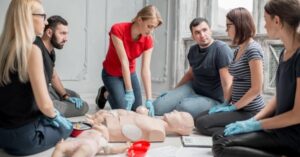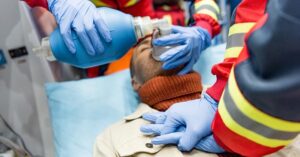Basic Life Support (BLS) certification is a crucial credential for healthcare professionals and those in emergency response roles.
But what does it mean to be BLS certified? This comprehensive guide will walk you through everything you need to know about obtaining your BLS certification, its significance, and the benefits it offers.
Do You Need American Heart Association Training? Learn More.

What Is Basic Life Support (BLS)?
Basic Life Support or BLS refers to a type of care that first responders, health care responders, and other public safety professionals provide to a person in a life-threatening emergency, such as cardiac arrest, respiratory distress, or obstructed airwaves.
EMR Safety and Health offers a BLS Certification Program that teaches students how to promptly recognize several life-threatening emergencies and respond with high-quality chest compressions, deliver ideal ventilation, and provide proper use of an Automated External Defibrillator (AED) and Bag Valve Mask (BVM).
Key Components of BLS Training
Delving into Basic Life Support (BLS) training reveals a set of essential components that lay the foundation for effective emergency response. Here, we break down the key elements that make BLS training a critical skill set for healthcare providers, including registered nurses:
Rapid Emergency Recognition: BLS begins with the ability to swiftly recognize life-threatening situations, including the need for infant CPR. This skill empowers healthcare providers and registered nurses to initiate immediate action when faced with critical emergencies.
Precise Chest Compressions: Central to BLS is the mastery of high-quality chest compressions. Students learn the precise technique, including compression depth and rate, ensuring that oxygenated blood continues to circulate to vital organs during CPR.
Proper Ventilation Techniques: BLS instruction emphasizes the correct method for delivering artificial ventilation to individuals who cannot breathe independently, including infants. This includes maintaining airway patency, delivering rescue breaths, and effectively utilizing a Bag Valve Mask (BVM).
AED Competence: BLS courses cover the operation of Automated External Defibrillators (AEDs), including their use in infant CPR situations. Students gain hands-on experience with these life-saving devices, which are designed to administer controlled electric shocks to restore normal heart rhythms during sudden cardiac arrest.
Collaborative Teamwork: In many emergency scenarios, healthcare providers, including registered nurses, work as part of a team. BLS training includes scenarios that focus on effective communication and teamwork among responders. Collaboration is vital for optimizing patient outcomes.
Legal and Ethical Understanding: A crucial aspect of BLS training is understanding the legal and ethical considerations when providing life-saving care. This knowledge ensures that healthcare providers, including registered nurses, are aware of their rights and responsibilities in emergency situations.
Ongoing Certification and Renewal: BLS certifications have a designated validity period, typically around two years. Maintaining up-to-date training and certification renewal is essential for healthcare providers, including registered nurses, to stay informed about the latest protocols and guidelines.
EMR Safety and Health’s BLS Certification Program comprehensively covers these core components, equipping healthcare providers and registered nurses with the knowledge and confidence needed to respond effectively in life-threatening emergencies. Whether you’re a dedicated individual seeking preparedness or a healthcare professional, our BLS course is an invaluable investment in saving lives.
If you’re ready to embark on the journey of becoming a proficient responder, explore our BLS Certification courses to take the first step.
Advantages of Obtaining a BLS Certification
EMR Safety and Health offers several courses and training classes, including CPR certification, that equip you with the knowledge and skills to respond better to life-threatening situations. Here are a few reasons why enrolling in a BLS certification class, especially for healthcare providers, makes sense:
Increase Confidence: Having robust confidence is extremely important in the medical field. Our BLS and CPR certification classes give you the confidence to act quickly and decisively in emergencies.
Always Be Prepared: The knowledge and experience you gain from these classes enable you to provide help to others in several scenarios, including at the workplace, on the road, at the mall, and more. Having a BLS and CPR certification equips you with critical knowledge to handle all sorts of situations, from choking to severe head injuries.
Increases Your Value as an Employee: Having a BLS and CPR certification means you have skills that will increase your value as a potential employee. Employers in some specific fields look favorably on applicants with BLS and CPR certifications. This is because most organizations prefer an employee who can perform and administer life-saving methods during workplace emergencies. Join our certification class today to enhance your skills and employability.

Who Should Enroll in BLS Classes?
A BLS Certification from EMR Safety and Health is ideal for healthcare personnel, including registered nurses, and other people who want to know how to perform basic cardiovascular life support (BLS) skills and CPR in a range of settings. Specifically, our BLS Certification program, which includes the HeartCode BLS course, is designed for:
- Doctors
- Nurses
- Paramedics
- Laboratory Technicians
- Clinical Officers
- Ambulance Drivers
- Pharmacists And Pharmacy Technicians
- Nurse Aids/ Healthcare Assistants / Orderlies
- Emergency Medical Technicians
- Safety Professionals and Managers
Basically, a BLS Certification is ideal for anyone who interacts with patients in various healthcare settings, including home care facilities.
Available BLS Certification Courses
A typical BLS Certification program, including basic life support (BLS) and CPR training, covers a wide range of areas designed to equip you with the necessary skills to respond better to emergencies. It may offer single-rescuer and team basic life support (BLS) skills, methods to evaluate an emergency, the measures to take, and legal concerns when offering life-saving care. It may also equip you with the knowledge to handle situations such as choking and drug overdoses.
At EMR Safety and Health, we offer a broad range of certification programs, including BLS, CPR training, and CPR class options, designed to prepare healthcare providers and other individuals for life-saving situations.
General courses for students
- BLS Certifications and renewals
- Advanced Cardiac Life Support (ACLS) Certifications and renewals
- Heartsaver basic CPR, AED, and First Aid Certifications and renewals
- Pediatric Advanced Life Support (PALS) Certifications and renewals
Instructor courses
- Safety compliance awareness trainer (S-CAT) courses
- American Heart Association instructor courses and renewals
- Leadership courses
Get Your BLS Certification Today
You can enroll for a full classroom course, take online courses or a blend of both. At EMR Safety and Health, our goal is to make an impact and increase awareness through quality training. Click here to learn more and to register.
Basic Life Support Certification Frequently Asked Questions
What does Basic Life Support (BLS) certification entail, and why is it crucial for healthcare providers?
BLS certification encompasses essential training to equip healthcare providers with the skills needed to respond effectively in life-threatening emergencies, including cardiac arrest and respiratory distress. It’s crucial for healthcare providers because it ensures they can deliver immediate, high-quality care in critical situations, significantly improving a patient’s chances of survival.
Who should consider pursuing BLS certification, and which healthcare professions can benefit from it?
BLS certification is vital for a diverse range of healthcare professionals, including physicians, nurses, paramedics, clinical officers, laboratory technicians, ambulance drivers, pharmacists, nurse aids, healthcare assistants, orderlies, and emergency medical technicians. Essentially, anyone in healthcare who interacts with patients in various settings, including home care facilities, can benefit from BLS certification.
What is the typical duration of a BLS certification course, and why is renewal necessary?
A standard BLS certification course usually takes approximately 3 to 4 hours for initial certification, while renewal courses are shorter, lasting about 2 to 3 hours. Renewal is essential because BLS certifications remain valid for two years. Regular renewal ensures that healthcare providers stay current with the latest guidelines and protocols, enhancing their ability to respond effectively in emergencies.
Are online BLS certification courses as effective as in-person training, and how do I choose the right one?
Many organizations, including EMR Safety and Health, offer both in-person and online BLS certification courses. Online courses provide flexibility and convenience, allowing healthcare providers to learn at their own pace. After students complete the online portion of the BLS course, they will need to schedule an in-person skill check where they demonstrate the skills they learned in front of an established American Heart Association (AHA) Instructor. Skill sessions focus on meaningful skills practice, debriefing, team scenarios, discussions of local protocols, and skills testing. To ensure effectiveness, it’s crucial to select an online course that is accredited and aligns with AHA’s certification requirements. Always verify that the chosen course offers comprehensive training and certification.
What key components are covered in BLS certification training, and how do they prepare healthcare providers for emergencies?
BLS certification training covers critical components, including rapid emergency recognition, precise chest compressions, proper ventilation techniques, AED operation, collaborative teamwork, and understanding the legal and ethical aspects of providing life-saving care. These components equip healthcare providers with the skills and knowledge needed to respond effectively in life-threatening situations, fostering confidence and preparedness.



